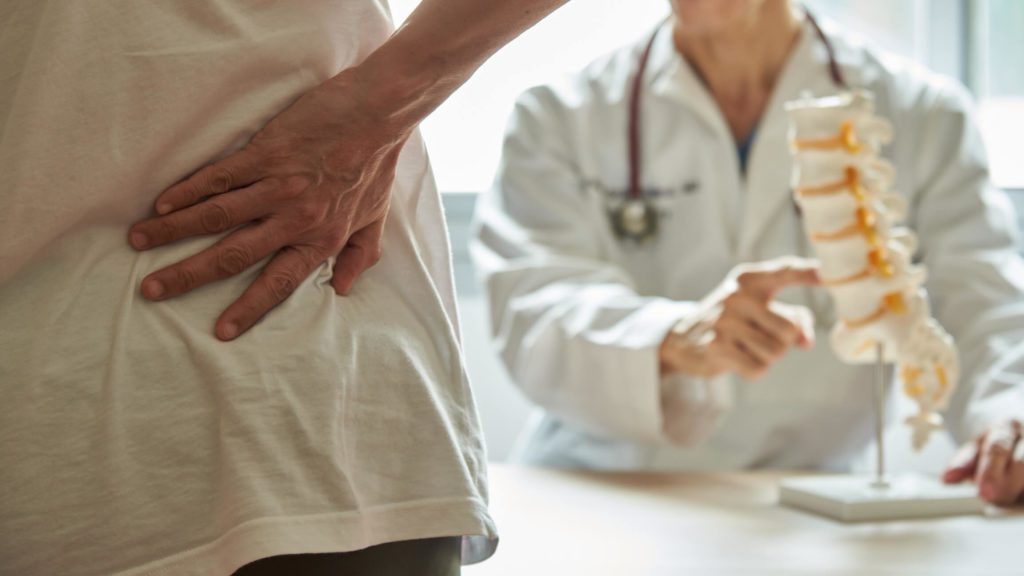Can a Fall Cause a Herniated Disk? Exploring the Link Between Trauma and Spinal Injury
Back pain is a common issue affecting millions. While many cases of back pain can be attributed to muscle strain, poor posture, or age-related wear and tear, some individuals experience more severe spinal conditions, such as herniated disks. One of the questions that often arises in premises liability claims is whether a slip and fall event can cause a herniated disk.
What is a Spinal Disk
To comprehend the relationship between falls and herniated disks, it’s essential to have a basic understanding of what a spinal disk is and what it does. The spine is composed of a series of vertebrae separated by intervertebral disks. These disks act as cushions, providing flexibility and shock absorption, allowing the spine to move comfortably and absorb the stresses it encounters.
Each intervertebral disk consists of two main parts: the annulus fibrosus and the nucleus pulposus. The annulus fibrosus is the tough, outer layer of the disk, while the nucleus pulposus is the soft, gel-like center. When the nucleus pulposus protrudes through a tear or weakness in the annulus fibrosus, it is referred to as a herniated disk.
The Role of Trauma in Herniated Disks
Traumatic events, such as falls, can indeed lead to herniated disks. When an individual falls, especially from a height or with a sudden impact, the forces experienced by the spine can be significant. These forces may cause the intervertebral disks to compress and deform. If the pressure is excessive or the force is applied unevenly, it can result in the disk’s outer layer (annulus fibrosus) tearing or weakening. Once this structural integrity is compromised, the inner nucleus pulposus may herniate, causing pain and other symptoms associated with a herniated disk.
Other Types of Trauma That Can Cause Herniated Disks
Various types of trauma can contribute to the development of a herniated disk. These include:
- Falls: Falls from heights, such as ladders or stairs, or even slipping and falling on a slippery surface, can generate enough force to damage the intervertebral disks.
- Car Accidents: Motor vehicle accidents can subject the spine to powerful, sudden impacts that may result in herniated disks. Whiplash injuries, common in car accidents, can also contribute to disk herniations.
- Sports Injuries: Contact sports or activities with a high risk of collisions, such as football or hockey, can lead to spinal trauma and herniated disks.
- Work-Related Injuries: Certain occupations, like construction or those involving heavy lifting, place individuals at a higher risk of falling or experiencing traumatic events that may lead to herniated disks.
- Other Accidents: Traumatic events that cause a sudden jolt to the spine, such as slips, trips, or falls at home or in public places, can also result in herniated disks.
Factors That Increase the Risk of Herniated Disks
While trauma is a significant factor in the development of herniated disks, several other factors can increase the risk of disk herniation, including:
- Age: The natural aging process leads to the degeneration of spinal disks, making them more susceptible to herniation.
- Genetics: Some individuals may have a genetic predisposition to disk degeneration, which can increase the likelihood of herniation.
- Repetitive Strain: Jobs or activities that involve repetitive bending, lifting, or twisting motions can contribute to disk degeneration and herniation.
- Poor Posture: Maintaining poor posture over an extended period can put excess stress on the spinal disks, making them more prone to herniation.
- Obesity: Excess weight can place increased pressure on the spine and lead to disk degeneration and herniation.
Symptoms of a Herniated Disk
The symptoms of a herniated disk can vary depending on the location and severity of the herniation. Common symptoms include:
- Back or neck pain
- Radiating pain, tingling, or numbness in the arms or legs
- Muscle weakness
- Reduced range of motion
- Changes in reflexes
- Diagnosis and Treatment
If you suspect you have a herniated disk, it’s crucial to seek medical attention promptly. Diagnosis typically involves a physical examination, review of medical history, and imaging tests, such as X-rays, MRI, or CT scans, to confirm the diagnosis.
Treatment options for herniated disks may include
- Rest: Taking it easy and avoiding activities that exacerbate symptoms can help the body heal naturally.
- Physical Therapy: Therapeutic exercises can strengthen the supporting muscles, improve posture, and reduce pain.
- Medication: Over-the-counter or prescription pain relievers may be used to manage pain and inflammation.
- Epidural Steroid Injections: Injections of anti-inflammatory medications directly into the affected area can provide relief.
- Surgery: In severe cases or when conservative treatments fail, surgical procedures like diskectomy or laminectomy may be recommended to alleviate symptoms and repair the disk.
Do You Have a Premises Liability Case? Speak to Our Slip and Fall Lawyers in San Antonio, Texas
If you have suffered a back or disk injury due to a fall, you need to speak with an attorney about your best course of action. Thomas J. Henry has been handling all types of premises liability cases in San Antonio and across Texas, and the entire United States. Our firm fights diligently on behalf of our severely injured clients to get the compensation they deserve for medical bills and lost wages. Premises liability cases are complex and require an experienced attorney on your side.
If you’ve been hurt on dangerous premises, call Thomas J. Henry Injury Attorneys today for a free case review. Our experienced San Antonio premises liability lawyers are available when you need us. Available 24/7, nights and weekends, our San Antonio premises liability law firm is ready to provide you and your family with a free legal consultation.


